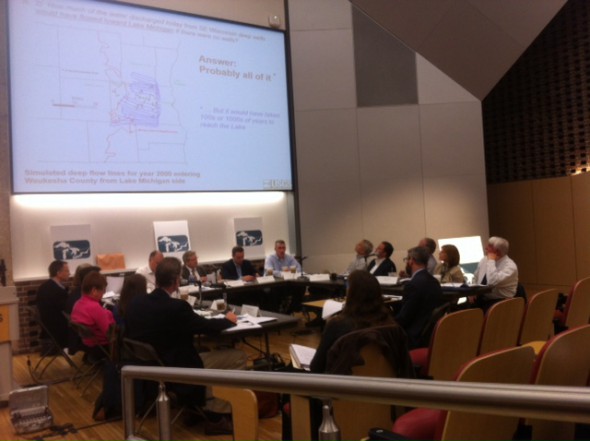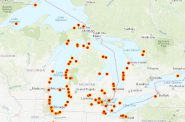Minnesota Stalls Waukesha’s Lake Michigan Plan
And could undercut attempts to achieve cooperation on Great Lakes Issues.

Representatives from Great Lakes states and Canadian provinces met in Chicago to study diversion request. Photo by Gary Wilson.
I’ve long said that the Great Lakes region needs to “get Waukesha right.”
That’s the process and precedent-setting decision that will determine if Waukesha – the Wisconsin city just outside the Great Lakes basin – can have access to Lake Michigan water.
But a stunt by Minnesota this week could jeopardize “getting it right.”
The review process for Waukesha’s request is in the home stretch.
Representatives from the Great Lakes states plus Ontario and Quebec have been meeting in person and via webinar for weeks. They’ve analyzed, discussed, studied and modified, leaving no stone unturned as they prepare to recommend what to do to their governors who have the ultimate decision.
The best outcome would be for all the states – Ontario and Quebec don’t get a vote – to agree on a consensus that may not be perfect for every state but one each state could live with. And one that protects the integrity of the Great Lakes Compact.
How’d it go?
Swimmingly. Almost.
I attended all but one of the of the five meetings and they were impressive.
True collaboration was in the air as state officials pored over documents, parsing and clarifying phrases and definitions. Hard questions were asked and answered.
Eric Ebersberger from the Wisconsin DNR responded to every question with patience, even if it was clearly a redundant one that he’d answered minutes earlier.
Michigan’s Grant Trigger was the de facto leader for the states and he meticulously applied his engineering rigor to the issues.
Ohio’s Jim Zehringer chaired the proceedings and bent over backwards – more than I would have – to make sure every voice was heard and every position and concern were considered.
While there were disagreements, there were no arguments. OK, I did see a few eyes roll on occasion, but that was the exception.
And Waukesha executives who were observing the proceedings were on their best behavior. They swallowed tough medicine when things didn’t go their way and never once rattled a legal sabre.
The process was working.
Issues big and small were resolved. A consensus for recommending Waukesha’s request with conditions was forming.
Then comes Minnesota Wednesday with a last second curve ball.
Just before the chair was going to poll the representatives to see if there was a consensus recommendation, Minnesota representative Julie Ekman requested a week long delay in the process.
Why?
“We’ve identified areas of ongoing concern” Ekman explained in an email response. She said the recess was needed “so that our governor could review the changes that had been made to the Declaration of Findings.”
Really?
While no one likes a last minute surprise to a long and arduous process, Minnesota’s request was granted. That was a charitable move by the chair as there was no basis for Minnesota’s request.
I followed up, asking Ekman why these issues of “concern” were raised at the last minute.
And didn’t Minnesota’s action put the comity and collaboration exhibited by the states, provinces, Wisconsin and Waukesha at risk?
Ekman didn’t respond before deadline for this column.
I come to public meetings on Great Lakes issues with skepticism. Too often they appear perfunctory. Outcomes are pre-determined and the meeting is simply a procedural requirement.
That wasn’t the case with the Waukesha decision.
There was nothing perfunctory about these meetings. All the right questions were asked and answered. The process was open to the point that I’ve never seen meeting participants so accessible and willing to talk to the media.
It was all positive.
Until Minnesota’s sudden last minute “concern” surfaced.
The Great Lakes region is on a losing streak with water stewardship.
The Flint and Toledo water crises cast a negative halo over our ability to manage 20 per cent of the Earth’s fresh surface water. Lake Erie’s algae problem is out of control with no solution in sight. As a region we look incompetent and clueless on drinking water quality.
In short, the region needs a water stewardship win and getting Waukesha right could be it.
Perhaps New York’s representative Don Zelazny summed it up best.
He told me his goal was to “provide a long term (water) solution for Waukesha residents” while adhering to the letter of the Compact.
That brass ring was within grasp.
Until Minnesota delayed the process.
A delay that borders on disrespect for the proceeding at best and is irresponsible at worst.
Gary Wilson is a commentator for Great Lakes Echo where this column first appeared.
Great Lakes Echo
-
Tracking Balloon Debris in Great Lakes
 Dec 3rd, 2019 by Tasia Bass Cont
Dec 3rd, 2019 by Tasia Bass Cont
-
Coal Ash Pollutes Midwest States
 Jun 5th, 2019 by Andrew Blok
Jun 5th, 2019 by Andrew Blok
-
Extreme Changes Forecast for Great Lakes
 May 21st, 2019 by Cassidy Hough
May 21st, 2019 by Cassidy Hough





















If “getting Waukesha right” is indeed the goal here, why such angst over a measly additional week to review the information? I would think someone who understands that these meetings are often perfunctory would appreciate someone wanting more time rather than making their decision immediately after the meeting.
And from what I’ve read, there were recent changes to Waukesha’s request, not something “known about for years” as you claim in your article. Just three days ago, the panel removed portions of adjoining communities from Waukesha’s planned service area and reduced the volume of water to be delivered. If service area and requested volume were a concern for Minnesota, they have every right to look at it again if the area and volume change.
It’s pretty easy to get it right: request denied.
Hey Scott do you remember when you shafted Minnesota by playing politics with the rail upgrade that was to go from Chicago to Milwaukee on to Madison and then to the Twin Cities? I hope Mark Dayton does not forget what a political hack Scott Walker is and give him a taste of his own medicine.
As quoted below, the author says this Compact has not been able to effectively manage 20 percent of the Earth’s fresh water. But then he’s beside himself that reps from one state want more time to review a monumental decision. Mr. Wilson, take a deep breath. It’s not the end of the world.
“The Flint and Toledo water crises cast a negative halo over our ability to manage 20 per cent of the Earth’s fresh surface water. Lake Erie’s algae problem is out of control with no solution in sight. As a region we look incompetent and clueless on drinking water quality.”
The flint water crisis had nothing to do with our inability to manage the great lakes water supply. It had EVERYTHING to do with an appointed city manager that made a quick decision to change the Flint water supply from coming from Lake Huron via Detroit, to the river in Flint, to save money, and then neglecting to add buffers/anti corrosives to the water. How does this even factor into the conversation?
Mr. Wilson wrote, “Outcomes are pre-determined and the meeting is simply a procedural requirement.” After reading the entire article, it appears Mr. Wilson was looking for the exact pre-determined outcome that gives Waukesha the approval. All I can say is hang tough Minnesota and Governor Dayton.
99.1% of more than 10,000 public comments oppose supply of diverted water from Lake Michigan to Waukesha. Many technical and sound reasons were provided in this dissent.
http://wisconsingazette.com/2016/04/13/public-record-majority-opposes-waukesha-quest-to-divert-water/
Given the level of Walker support in Waukesha County, Walker seems likely to disregard opposition expressed by 99.1 percent of those who publicly commented.
And Michigan’s Gov. Snyder, architect of Flint’s poisoned-water fiasco, can’t be trusted to look out for his citizens, let alone the Great Lakes.
However, Minnesota does have a long record for being forward thinking and discerning about environmental issues. Gov. Dayton indeed is the one to watch.
Marie,
Gov’s Cuomo and Wolf are ones to watch as well
Although the Premiers of Ontario and Quebec have no vote in the Compact’s decision, they are parties in the process. A friend from Ontario told me that despite the stereotype of Canadians being overly nice that “they won’t necessarily play nice” when the potential degradation of the water they share with us is at issue. Remember: Lakes Superior, Huron, Erie and Ontario are all as much a part of Canada as they are of the United States. Lake Michigan is alone among the Great Lakes to be within the boundaries of the U.S.A. – and Lakes Michigan and Huron are actually one lake with two names.